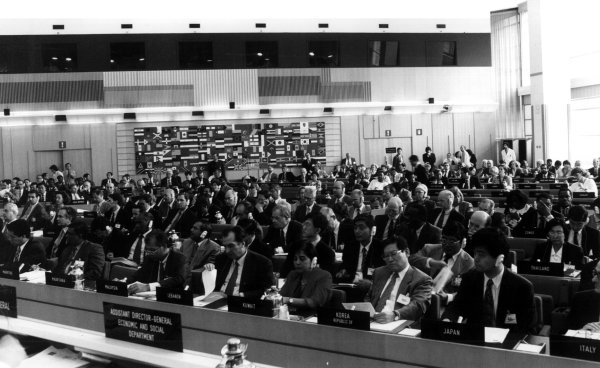There are important synergies between FAO and WTO in the area of trade. In many specialized fields FAO has expertise that can be drawn on by WTO and its members, most of whom are also members of FAO. WTO's competence in trade-related matters is a valuable resource for assisting FAO in strengthening its programmes.
One of FAO's key strengths is in its continual monitoring of the global food supply and demand situation. The Organization's Global Information and Early Warning System (GIEWS) is a unique source of current information that is useful for implementing the Decision on Measures Concerning the Possible Negative Effects of the Reform Programme on Least-Developed and Net Food-Importing Developing Countries.
FAO's Consultative Sub-Committee on Surplus Disposal administers the Organization's Principles of Surplus Disposal, which are included in the disciplines in the Agreement on Agriculture. It is also in a position to provide statistics and to assess the food security situation in connection with provisions of the Agreement on Agriculture relating to export prohibitions and restrictions. All of these subjects are of direct concern to the WTO Committee on Agriculture.
FAO and WTO have a close and expanding working relationship in matters related to sanitary, phytosanitary and food standards. The Joint FAO/WHO Codex Alimentarius Commission (CAC) and the International Plant Protection Convention (IPPC), for which FAO provides the secretariats, are specifically required to collaborate with the SPS and TBT Committees.
FAO plays an important role in addressing environmental matters that have significant implications for trade in the agriculture, forestry and fisheries sectors.
WTO bodies relevant to FAO activities� General Council FAO has observer status in these bodies and actively collaborates with WTO. FAO expertise relevant to WTO� Global up-to-date data and information on agriculture, forestry and
fisheries FAO is equipped to provide technical assistance to member countries to strengthen their institutional capacity for meeting obligations under the Uruguay Round Agreements and for maximizing the resultant benefits.
|
Within the UN, FAO is the principal source of scientific expertise on a
range of environmental matters, including biodiversity which is a subject of paramount
concern to the WTO Council for Trade-Related Aspects of Intellectual Property Rights
(TRIPS) and is reflected
in the international Convention on Biological Diversity (CBD) which entered into force in
December 1993. FAO's intergovernmental Commission on Genetic Resources for Food and
Agriculture is a key body involved in setting priorities and guiding programme activities
related to biodiversity and other areas concerning plant and animal
genetic resources.
Almost all current multilateral environmental agreements with trade
provisions involve plants and animals (either domesticated or from wild sources). FAO is
the repository for a number of those agreements and is
also responsible for related accords
such as the:
FAO is also one of the international organizations from which countries request information regarding the extent to which species of flora and fauna are threatened, particularly timber and farm animal species. Safe food processing and production methods as well as ecolabelling are other topics in which FAO has a comparative advantage.
